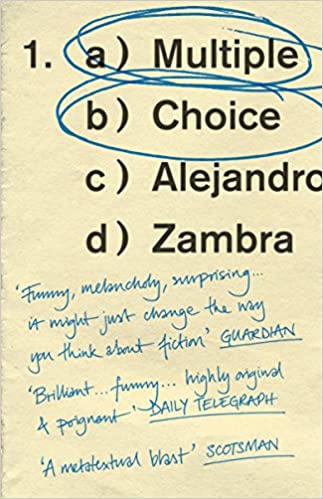OK I GIVE UP
Multiple Choice

This slim book is essentially a creative exercise to apply a “social technology” to literature, namely that of the centralized college entrance examination. Such examinations, necessarilly consisting of multiple choice to enable standardization, are tools used in a number of countries to limit and control access to higher education, and also to keep the universities under control for political reasons. Coincidentally, I’m pretty knowledgeable about this kind of examination, as I had to prepare for and take part in a number of them for, first, high school, and then university, and know pretty well not only the format of the various kinds of questions, but the general effect it has on the youth and, as they grow up, the society. The questions in the actual exams are separated by discipline (math, physics, literature etc), and have certain forms. The patterns adopted in this book are, unsurprisingly, based on literature questions, and purportedly require the reader to match similar words, fill in blanks, answer reading comprehension questions or put sentences in coherent order. Some of the tasks are more poetic and pull the reader in, like filling the blanks or sentence ordering, while others, such as reading comprehension, present biting stories, and even more biting questions that follow them.
Zambra uses these new methods of textual devices rather daftly, mainly thanks to his humor and concern with perennially human topics. One recurring theme is the relationship to the mother and especially father; broken relationships, sex, and growing up constitute the rest of the book. The great thing about Multiple Choice is that at no point the use of the multiple choice format appears gimmicky or forced. The reader gets a very good sense, even through the humor and the sexual content, of how deeply Zambra is involved with the plight of his home country, making side jabs at various political turning points here and there. How the multiple choice test itself has formed the youth and future of the society is expressed in one of the key paragraphs by a sympathetic teacher of religious studies, when he says that the students were not educated, they were trained. At least, it produced someone like Zambra to document and mock it all.